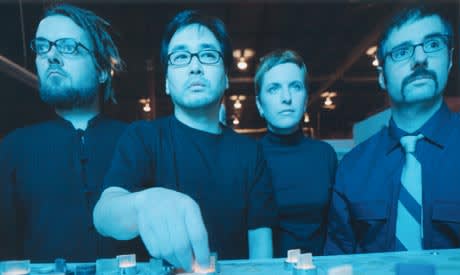Al Okada used to give new meaning to the term "one-man band. The multi-instrumentalist (formerly of Guelph groove merchants King Cobb Steelie) created the ambient sounds of Microbunnys 2002 debut himself through sampling and looping, bringing in Tamara Williamson to lend her haunting vocals to the proceedings. With their new Dead Stars disc, Microbunny is now more of a full-band effort Williamson wrote her own lyrics and melodies and madcap drummer Sam Cino and bassist Mitch Girio were an integral part of the proceedings. And it shows Dead Stars builds on the first albums sonic palette, moving beyond mere studio trickery to flesh out some of Okadas earlier material into a warm swirl of sound. While close kin Cinematic Orchestra and Portishead share a similar languid downbeat aesthetic, Microbunny steers clear of the earthy and heads straight for outer space. With a song named after a Star Trek planet ("Gamma Hydra IV) and the epic build-up of the 23-minute title-track, Dead Stars is nothing short of
interstellar.
Some of the tracks were pieced together from material that dates back as far as 16 years why unearth older recordings? Okada: It wasnt intentional, it just seemed to happen that way. Although I do love the idea of recycling old ideas in new ways. One piece of music, "Season of Change, reappeared spontaneously while I was playing guitar by myself. I just found myself playing it and realised that I still loved the chord sequences, but had never quite found a way to properly record and arrange it. So I just took the bare skeleton of the chords and played it on another instrument [Wurlitzer] and it found a rebirth. It also had a specific lyrical meaning originally when it was written, that connected to an incident that was the inspiration for the title track, "Dead Stars.
How do you translate these largely studio-based songs into a live setting? It's complicated! We have to separate superfluous elements from essential ones and determine who can actually play what on stage. I also have to ascertain whether a midi sequence is needed to glue it together or if I can manually trigger loops and maintain a more flexible live song structure. The more complex, the less likely this becomes.
What's with the Star Trek references? I've had a lifelong love of the original Star Trek series. But not like a "Trekkie loves it. I think it is the most unintentionally funny show ever made. Strangely, though, the names and references have some metaphoric connection to the real meaning of the song, which has subsequently presented itself to me.
(Kindling)Some of the tracks were pieced together from material that dates back as far as 16 years why unearth older recordings? Okada: It wasnt intentional, it just seemed to happen that way. Although I do love the idea of recycling old ideas in new ways. One piece of music, "Season of Change, reappeared spontaneously while I was playing guitar by myself. I just found myself playing it and realised that I still loved the chord sequences, but had never quite found a way to properly record and arrange it. So I just took the bare skeleton of the chords and played it on another instrument [Wurlitzer] and it found a rebirth. It also had a specific lyrical meaning originally when it was written, that connected to an incident that was the inspiration for the title track, "Dead Stars.
How do you translate these largely studio-based songs into a live setting? It's complicated! We have to separate superfluous elements from essential ones and determine who can actually play what on stage. I also have to ascertain whether a midi sequence is needed to glue it together or if I can manually trigger loops and maintain a more flexible live song structure. The more complex, the less likely this becomes.
What's with the Star Trek references? I've had a lifelong love of the original Star Trek series. But not like a "Trekkie loves it. I think it is the most unintentionally funny show ever made. Strangely, though, the names and references have some metaphoric connection to the real meaning of the song, which has subsequently presented itself to me.




